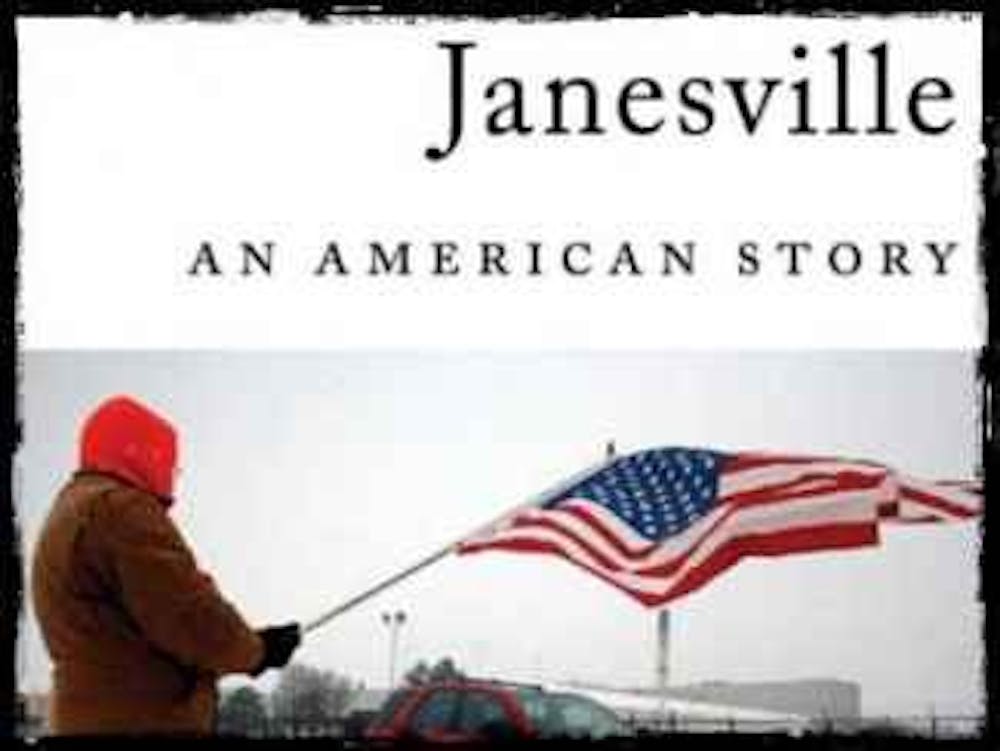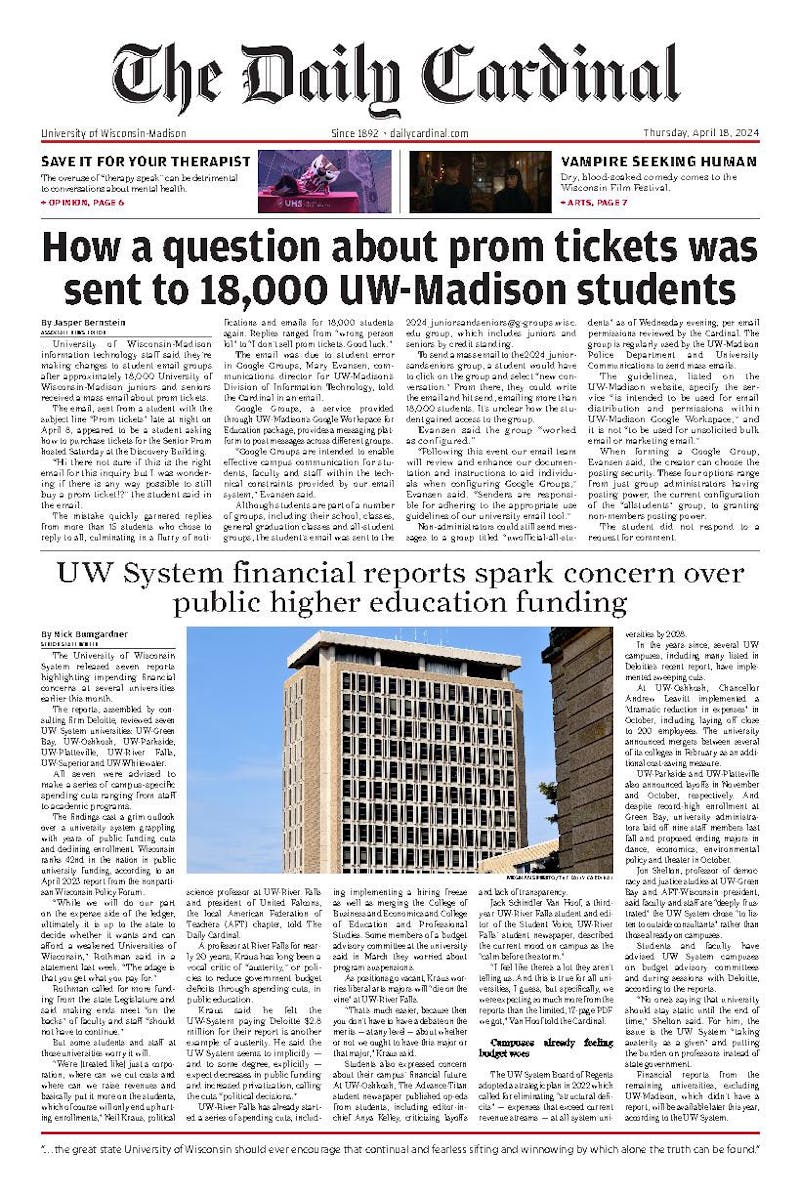“I’ve got a question,” said Amy Goldstein, veteran Washington Post staffer and the writer of “Janesville: An American Story.” She paused and pulled back her frizzy red hair, scanning the book festival audience from a pedestal at the Madison Public Library. Her book is about the closure of Janesville’s General Motors plant, but nobody in the crowd was wearing steel-toed boots or worn-in work pants; it was more of a sneaker and wool sweater affair — an assortment of Madison professionals. She asked her question anyway: “How many of you here have some connection to Janesville and the plant?” Dozens of hands proudly shot up.
I already knew that the guy sitting to my left had no connection whatsoever. I asked him before Goldstein walked onto the stage. With a smirk of relief he informed me that he’d never even been to Janesville, the blue-collar city about an hour south of Madison, but he felt “awfully bad” for the people there and found Goldstein’s new book “informative.”
I did know, however, that the man to my right was going to raise his hand. John Elliott’s face, framed by a set of long, grey sideburns, previously nodded when I asked if he had connections to Janesville. “The town was kind of awful,” the Edgewood College librarian said. “I don’t say this to be mean to my old town, though. It’s very sad what’s happened.”
Elliott grew up in Janesville during the GM boom years, when “there was a lot of money in Janesville.” The union men lived like “blue-collar royalty,” buying motorboats and big houses and snowmobiles. Sure, the non-GM workers resented the GM guys, with their platinum pensions and their UAW Local 95 membership cards, but the wages pumped money and pride into the community.
“Now I go back there and the town looks like hell,” Elliott said. “And I don’t think it’ll ever come back.”
Of Elliott’s high school group, which he gleefully described as “hippies” with “long hair,” only one went on to work at the plant. “Tom worked on the line, never went to college,” Elliott explained. “He retired at 52. He has enough money to live, but I can tell he’s depressed, because the world he knew is gone. When you’re a union plant guy for 30 or 40 years and that all goes away, who are you now?”
Goldstein’s book grapples with that question. She follows working-class Janesville families as they adjust to the loss of the nation’s oldest-operating GM factory after the last Chevy Tahoe rolled off the line two days before Christmas in 2008. Some of what followed are stories of triumph over adversity. Some are not.
There’s a third-generation union rep that makes the painful decision to help workers from the “company side” by enrolling in HR classes at Blackhawk Technical College. Then there’s his wife, who enrolls at Blackhawk after being laid off and earns high marks in the criminal justice program. There are GM “gypsies” who opt to commute to GM plants in places like Fort Wayne or Kansas City during the week and return home to their families on weekends. There are ex-linemen (accustomed to making $28 an hour) who take jobs at non-unionized manufacturers for less than half their former wages. She’ll trace their descents into poverty.
Meanwhile, there’s a noble teacher who notices kids “losing weight” and looking a little scruffier, so she starts a food drive. There’s the local M&I Bank president who takes time away from her plush job to lead the effort to save the economy from free-fall.
It’s a bit difficult to keep the long list of characters straight, as they come in and out of the story: “I wanted this book to feel like a kaleidoscope,” Goldstein told us. But by refusing to write in banal generalizations about the working class, Goldstein is able to tell a powerful story about how a uniquely civic-minded community was splintered by omnipresent economic forces and indifferent executives. She’s able to weigh the value of work using terms like “dignity” and “responsibility” instead of “paycheck” and “mortgage.”
“Janesville” joins a growing genre of books that has gained prominence after the 2016 election cycle. Call it the literature of “post-industrial malaise” or “the downside of neoliberalism’s ascent.” It includes books like “The Unwinding,” “Strangers in Their Own Land” and “Hillbilly Elegy” — this year’s controversial Go Big Read book. The genre tries to make sense of the economic nationalism, racism and xenophobia that seem to accompany industrial blight.
But what’s now loosely defined as “Trumpism” is not what Goldstein finds in Janesville. The city remains strongly Democratic; Rock County went 52 percent for Clinton in 2016. The characters in the book are more apt to enroll in career retraining programs at the local tech school than to blame minorities. In fact, they have a hard time blaming anyone at all. Here’s one character, Matt Wopat, as he decides to quit tech school and commute to Fort Wayne’s GM plant every workweek to avoid bankruptcy:
“As his mind churns on this jam he is in, the strangest thing is that he can find absolutely no one to blame. Not … the government, dutifully paying for classes for a job he might never get. Not GM, shelling out for his benefits even as the company had gone bankrupt. Certainly not [his wife], trying her damnedest to find a job better than restocking her Hallmark displays a couple of days a week. Not even himself.”
As for Goldstein, she’s pleased with how her project turned out, and she said she’s happy she picked Janesville as her subject. “One of the side effects is … that Madison has become a kind of second home to me,” she told the festival audience. But it almost didn’t turn out that way. Explaining why she picked Janesville over other rust-belt cities, she said, “I thought that Janesville was a cool American-sounding name. Now that appealed to me. I thought, if I was going to be living with a name, I like the fact that it’s Janesville.”






